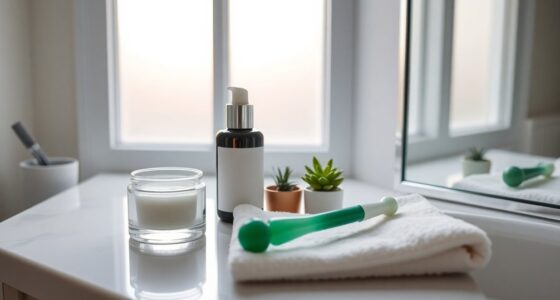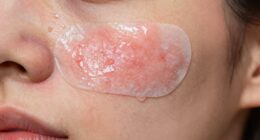To manage oily skin without causing dryness, start with a gentle cleanser to remove excess oil without irritation. Use salicylic acid-based products to help unclog pores while maintaining hydration with lightweight, oil-free moisturizers. Exfoliate 1-2 times a week with mild chemical exfoliants to enhance skin texture. Incorporate a balanced diet and stress management techniques for overall skin health. Want to learn more about effective products and home remedies? Keep going for additional tips!
Key Takeaways
- Use a gentle, foaming cleanser with salicylic acid to effectively remove excess oil without irritating the skin.
- Incorporate lightweight, oil-free moisturizers with hyaluronic acid to hydrate without clogging pores.
- Exfoliate 1-2 times a week with gentle chemical exfoliants to remove dead skin and control oiliness.
- Apply clay masks weekly to absorb excess oil while nourishing the skin without dryness.
- Maintain a balanced diet rich in omega-3 fatty acids and antioxidants to support skin health from within.
Understanding Oily Skin

Oily skin can be a frustrating challenge for many people. It's often caused by excess oil production from your sebaceous glands, leading to a shiny complexion and larger pores, especially on your nose. You might find that your skin feels greasy by midday, and if you're acne-prone, this can be particularly distressing. Curiously, oily skin can also be dehydrated; your skin may produce excess oil to compensate for a lack of moisture. To effectively manage your oily skin, establish a consistent skincare routine that includes gentle cleansing. Incorporating products with glycolic acid can help exfoliate dead skin cells and reduce the appearance of oiliness.
Moreover, maintaining hydration essential is key to prevent your skin from overcompensating with oil production. Look for non-comedogenic products to prevent clogged pores and always remember to moisturize your skin to maintain hydrated skin. Balancing oiliness while keeping your skin healthy is key!
Key Symptoms of Oily Skin

If you've got oily skin, you might notice a shiny appearance, especially in your T-zone. Enlarged pores and frequent breakouts can also be common issues, making your skin feel rough and congested. Recognizing these symptoms is the first step in managing oily skin effectively. Additionally, maintaining a balanced diet rich in omega-3 fatty acids can help support healthy skin and reduce oiliness. Incorporating antioxidant-rich foods into your diet may further enhance your skin's appearance and health.
Shiny Skin Appearance
A shiny skin appearance is one of the most noticeable symptoms of oily skin. This shine typically appears on your forehead, nose, and chin, known as the T-zone, due to excess sebum production.
You might feel a greasy layer by late morning, making it challenging to maintain a fresh look. Large pores often accompany oily skin, contributing to that shiny appearance. Clogged pores can lead to a rough texture, making it essential to adopt a proper skin care routine. To combat the shine and promote healthy skin, focus on products that help reduce oil without drying you out. Air purifiers can also help improve your skin's overall health by filtering out airborne allergens and pollutants.
Hydrated skin is key, so remember to balance your routine to guarantee your skin feels fresh and looks its best throughout the day. Additionally, incorporating nutrient-rich ingredients into your diet can help improve your skin's overall health.
Enlarged Pore Size
Enlarged pores are a telltale sign of oily skin and can be frustrating to deal with. They often appear due to excess sebum production, which stretches pore walls.
To reduce their appearance, regular exfoliation is key; aim for 1-2 times a week to remove dead skin cells that clog pores. This practice not only helps minimize pore size but also prevents acne breakouts. Additionally, consistent maintenance of your skincare routine can prevent costly repairs to your skin health.
Moreover, choosing non-comedogenic and oil-free products is essential. These formulations prevent further oil buildup, keeping your skin hydrated without exacerbating pore size. Moreover, understanding risk factors like hormonal changes and lifestyle choices can help you address the underlying causes of oily skin.
Frequent Breakout Occurrence
Managing enlarged pores can lead to another significant concern: frequent breakouts. If you have oily skin, excess sebum can easily clog pores and trigger acne formation.
You might notice a shiny appearance, especially on your forehead and nose, along with large pores that seem to amplify the issue. This greasy feeling often develops by late morning, making your skin appear rough and requiring more frequent makeup touch-ups. Regular use of air purifiers with HEPA filters can also help reduce airborne pollutants that may contribute to skin irritation and breakouts.
To combat frequent breakouts, establishing a proper skincare routine is essential. Regular cleansing helps to remove excess oil and debris, which can reduce the frequency of breakouts. Additionally, incorporating stress management techniques can help regulate oil production and improve overall skin health.
Effective Cleansing Techniques

To manage oily skin effectively, you need to choose gentle cleansing products that won't irritate or dry out your skin.
Cleansing twice a day is essential, but over-cleansing can actually make things worse.
Stick to a routine that balances oil removal without stripping your skin's natural moisture.
Gentle Cleansing Products
While it might be tempting to use harsh cleansers to combat oily skin, opting for gentle cleansing products is key to maintaining a healthy balance.
Choose a gentle, foaming face wash specifically formulated for oily skin. This will effectively cleanse away excess oil without stripping your skin of its natural moisture.
Avoid harsh cleansers containing sulfates or alcohol, as they can cause irritation and increase oil production. Incorporate a salicylic acid-based cleanser to help unclog pores and reduce oiliness.
Always remember to remove makeup before bed to prevent clogged pores and breakouts. After cleansing, pat your face dry with a clean towel to maintain your skin's moisture barrier and avoid further irritation.
Proper Cleansing Frequency
Finding the right cleansing frequency is vital for effectively managing oily skin. You should aim to cleanse your face twice daily using a gentle, foaming cleanser specifically formulated for oily skin. This helps remove excess oil without irritation.
Incorporating a salicylic acid cleanser can further assist in preventing breakouts and unclogging pores. Stick to a consistent routine—morning and night—to avoid overwashing, which can disrupt your skin barrier and worsen oiliness.
After cleansing, always apply a lightweight, oil-free moisturizer to maintain hydration levels. This balance is essential; keeping your skin hydrated prevents it from overproducing oil.
Avoid Over-Cleansing Techniques
Cleansing your face too often can backfire, leading to increased oil production and irritation. Stick to a consistent routine by cleansing twice daily with a gentle foaming cleanser. This helps remove excess oil without stripping your skin's natural moisture. Avoid harsh soaps or scrubs that can irritate and cause overproduction of oil. Opt for a non-comedogenic cleanser with salicylic acid to manage oil effectively. After cleansing, always apply a lightweight, hydrating moisturizer to maintain skin hydration and curb excess oil production.
| Step | Action | Product Type |
|---|---|---|
| 1 | Cleanse morning & night | Gentle foaming cleanser |
| 2 | Avoid harsh cleansers | Non-comedogenic |
| 3 | Use salicylic acid | Oil-control cleanser |
| 4 | Moisturize after cleansing | Lightweight moisturizer |
The Importance of Exfoliation

Exfoliation is essential for managing oily skin, and incorporating it into your routine just 1-2 times a week can make a significant difference.
It helps remove dead skin cells and prevents clogged pores, which can worsen oiliness and acne. Here are three key benefits of exfoliation:
- Improves skin texture: Regular exfoliation promotes cell turnover, allowing for smoother skin and better absorption of other products.
- Enhances oil control: Gentle chemical exfoliants like salicylic acid and glycolic acid help reduce excess oil without irritation.
- Boosts clarity: Using clay masks weekly can deeply cleanse pores and absorb excess sebum, contributing to overall skin clarity.
Just remember, over-exfoliating can backfire, leading to increased oil production.
Balance is key!
Choosing the Right Skin Care Products

Choosing the right skincare products is vital for managing oily skin effectively. Start by selecting oil-free and noncomedogenic options to prevent clogged pores and reduce excess oil.
Look for active ingredients like salicylic acid in your cleansers and treatments, as they help control oiliness without causing dryness.
When it comes to moisturizers, opt for lightweight formulas containing hyaluronic acid to keep your skin hydrated without adding extra oil.
It's important to avoid harsh, alcohol-based products that can strip your skin of its natural oils, leading to increased sebum production.
Finally, choose makeup specifically designed for oily skin, such as water-based foundations and matte finish products, to help control shine and maintain a balanced complexion.
Home Remedies to Combat Oily Skin

Finding the right skincare products can set the foundation for managing oily skin, but home remedies offer additional benefits that can enhance your routine. Here are three effective options:
- Honey: Apply raw honey as a mask for 10 minutes to leverage its antibacterial properties while keeping your skin moisturized.
- Clay Masks: Mix French green clay with water to absorb excess oil and improve skin texture without drying it out.
- Oatmeal: Combine ground oatmeal with yogurt or honey to create a soothing paste that calms inflammation and absorbs oil.
You can also try a mask of egg whites and lemon juice for tightening effects, or apply aloe vera overnight to hydrate and soothe irritations without adding excess oil.
Lifestyle Changes for Healthier Skin

While skincare products play an essential role in managing oily skin, making lifestyle changes can greatly enhance your results.
Start by maintaining a balanced diet rich in antioxidants and low in sugar and refined carbs to reduce oil and improve overall skin health.
Don't forget to stay hydrated by drinking plenty of water daily; this helps regulate oil levels and keeps your skin hydrated.
Incorporate regular exercise into your routine, as it boosts circulation and flushes out toxins.
Stress management techniques, like yoga or meditation, can help control hormonal fluctuations that lead to excess oil.
Finally, make certain you get adequate sleep each night to maintain hormonal balance and reduce oiliness.
These changes can make a significant difference in your oily skin!
Frequently Asked Questions
How to Stop Skin From Being Oily?
To stop your skin from being oily, start by washing your face twice a day with a gentle foaming cleanser.
You'll want to focus on oil-free, noncomedogenic products that hydrate without clogging pores.
Incorporate a toner with witch hazel to help refine your pores and control oil.
Using clay or charcoal masks weekly can also absorb excess oil.
Finally, stay hydrated and eat a balanced diet to keep your skin in check.
How Can I Clear My Oily Face Naturally?
Imagine your face as a slippery slip 'n slide, glistening with oil! To clear that oily sheen naturally, try honey as a mask for its antibacterial magic.
Mix French green clay with water for a gentle oil-absorbing treatment, or whip up a soothing oatmeal paste.
For a tightening effect, blend egg whites and lemon juice, but skip it if you're allergic.
Don't forget aloe vera to keep your skin calm and hydrated!
How Do You Fix Dry Oily Skin?
To fix dry oily skin, you need to strike a balance. Start by using lightweight, oil-free moisturizers with hydrating ingredients like hyaluronic acid.
Incorporate gentle exfoliation with products containing glycolic or salicylic acid once or twice a week. Choose non-comedogenic items labeled "oil-free" to avoid clogging pores.
Finally, drink plenty of water and eat a diet rich in antioxidants to support your skin's overall health and hydration.
How Can I Hydrate My Oily Skin?
You might think hydrating oily skin is a challenge, but it's easier than you think.
Start by choosing lightweight, oil-free moisturizers that pack a punch with ingredients like hyaluronic acid.
Don't forget hydrating toners with soothing aloe vera or witch hazel—they balance moisture beautifully.
Also, consider using gel masks for an extra boost.
And remember, drinking plenty of water keeps your skin hydrated from the inside out.
You've got this!
Conclusion
In your quest for balanced skin, think of it as tending to a delicate garden. You've learned to nurture your complexion without drowning it in harsh treatments. Embrace gentle cleansers, invigorating exfoliants, and nourishing products that let your natural glow shine. Remember, just like a flourishing garden thrives with care, your skin will flourish with the right habits and remedies. So, step outside with confidence, knowing you can keep that oily shine at bay while keeping your skin healthy and vibrant.









